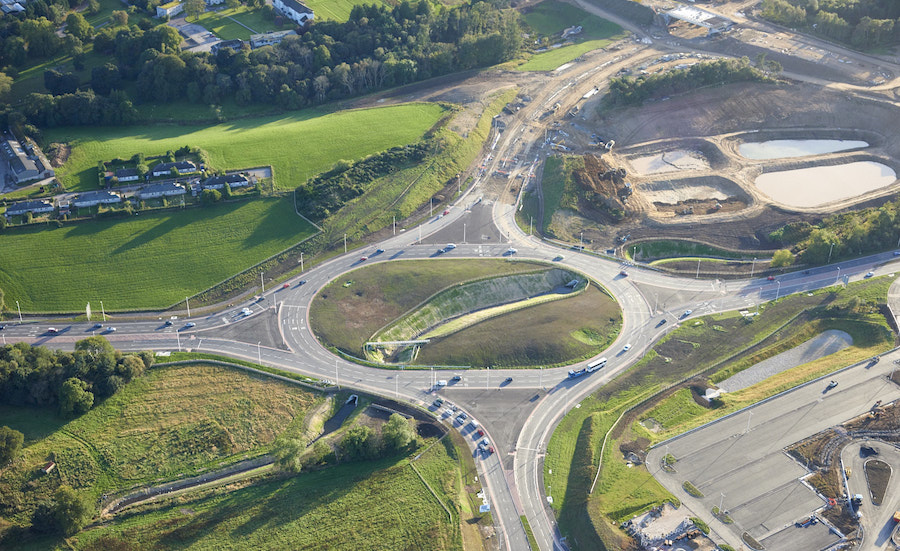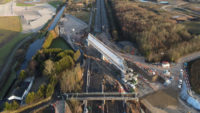Citing a “near-death experience” four years ago for the UK’s largest contractor as it faced serial profit warnings and likely sale or collapse, Balfour Beatty plc CEO Leo Quinn says the firm now is on “foundations for the next 100 years.”
The executive, a BB civil engineer in the 1970s, rejoined as CEO in 2014 from a former role heading a $2.5-billion UK defense contractor he is credited with turning around.
He told BB investors on March 14 in announcing the firm’s 2017 results that it is set to reach “industry-standard” profit margins by year end. The contractor survived its battering from loss-making contracts without increasing debt or raising new equity from shareholders, said Quinn, who has restructured its culture and operations.
Management was “in a position where [it] had physical assets to sell, unlike Carillion,” says Kevin Cammack, an analyst at Cenkos Securities, referring to peer UK contractor Carillion plc., which went into compulsory liquidation in January after failing to win support from its creditor.
BB’s 2017 UK operations moved into the black for the first time in recent years, contributing to a $175-million hike in group underlying profit from operations to $274 million. “Profits have doubled over the past 12 months,” said Quinn, adding that BB’s $16-billion order book greatly reduces its “risk profile.”
To reduce the type of project risks that caused eight profit warnings around 2014, the firm “is much more selective in what we are bidding,” said Quinn. In the UK, the share of fixed-price, one-stage bids targeted has fallen from 50% to under 20% in a year, added Chief Financial Officer Phil Harrison.
Geographically, the company has pulled out of the Middle East, Indonesia and Australia to focus on Hong Kong, the UK and US. The latter’s sales grew 6% to about $5 billion last year, with profit up 24% to $57 million.
Among US project wins, BB in January secured a slice of the $1.95-billion public-private partnership for a 2.25-mile people mover at Los Angeles International Airport. The firm has 30% of the three-firm construction joint venture and, separately, owns 27% of project equity. The deal is BB’s first-of-its kind in the US, now the company’s main P3 market, said Quinn.
Sharpening BB’s bidding discipline, Quinn also reshaped its disparate UK units operating like “fiefdoms [with] the reward structure based on the top line,” he added. Quinn created a “culture of openness and … well-being of the business … and a level of accountability and spirit,” Cammack said.
In its 2017 figures, BB excluded non-“underlying” items, such as a $61.5-million loss from the collapse of Carillion, a joint venture partner on Scotland’s 46-km Aberdeen Western Peripheral Route. BB and remaining partner Galiford Try plc took over Carillion’s share of the $1-billion design-build-finance-operate project, to finish in summer.
Inheriting some Carillion debt, BB also employed 150 of its infrastructure and highway specialists. They are among some 8,500 Carillion employees who have secured new jobs, according to the government. More than 1,500 were laid off while 7,300 UK staff continue working on Carillion projects until new arrangements can be made.
Another ex-partner, Kier Group plc., has offered jobs to Carillion staff on joint ventures for a highway project and two large sections of the UK high-speed rail program from London to Birmingham. In half-year results last June, Kier said it was “evaluating the impact” of changes on future profits.
Continuing is the parliamentary probe into the Carillion collapse, with payouts of $8.9 million to external lawyers and financial advisers three days before the event among the new revelations by investigators.
Carillion’s failure was “painful” for its subcontractors, said Cammack. But, with just 5% of the UK market, its wider impact has been small.
“There is hope it may change the way the industry deals with its supply chain and customers,” he added. But it’s an “element of hope rather than expectation.”



